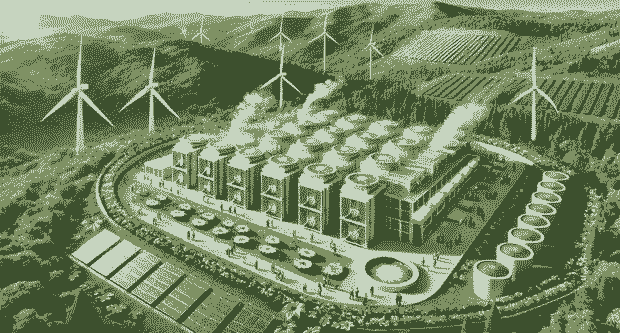Question: What potential does algae carry as a sustainable biofuel?
As the world grapples with the challenges of climate change and depleting fossil fuel reserves, the search for sustainable and renewable energy sources has become more urgent than ever. Among the various alternatives being explored, algae have emerged as a promising candidate for biofuel production. Algae, with their rapid growth rates and high lipid content, offer significant potential as a sustainable biofuel source. This article examines the use of algae as an alternative energy source, its environmental benefits, and the challenges of large-scale production.
Understanding Algae Biofuels
Algae are simple, plant-like organisms that can grow in various aquatic environments, including freshwater, seawater, and wastewater. They are capable of photosynthesis, converting sunlight, carbon dioxide, and nutrients into biomass. This biomass can be processed to produce biofuels, such as biodiesel, bioethanol, and biogas.
Types of Algae for Biofuel Production
- Microalgae: These are microscopic, single-celled algae that grow quickly and have high oil content. They are the primary focus of biofuel research due to their efficiency in converting sunlight into energy-rich lipids.
- Macroalgae: Also known as seaweed, these larger algae are typically harvested from oceans. While they have lower lipid content compared to microalgae, they can still be used to produce bioethanol and biogas.
Environmental Benefits of Algae Biofuels
1. Reduced Carbon Footprint
Algae biofuels offer a significant advantage over fossil fuels in terms of carbon emissions. During their growth, algae absorb carbon dioxide from the atmosphere through photosynthesis. This process helps offset the CO2 released when the biofuel is burned, making algae biofuels nearly carbon-neutral. Furthermore, using algae to capture industrial CO2 emissions can help mitigate greenhouse gas accumulation.
2. High Yield and Productivity
Algae can produce much higher yields of biofuel per acre compared to traditional biofuel crops like corn or soybeans. They can grow in a variety of environments, including non-arable land, which does not compete with food crops for agricultural land. Additionally, algae can be grown in brackish water or wastewater, reducing the strain on freshwater resources.
3. Wastewater Treatment
Algae can play a dual role in biofuel production and wastewater treatment. They can absorb nutrients such as nitrogen and phosphorus from wastewater, reducing the need for chemical treatments. This not only cleans the water but also provides the algae with essential nutrients for growth.
Challenges of Large-Scale Algae Biofuel Production
1. Cost of Production
One of the primary challenges of scaling up algae biofuel production is the high cost. Current technologies for cultivating, harvesting, and processing algae into biofuel are expensive. The cost of producing algae biofuels needs to be reduced to make them competitive with fossil fuels.
2. Energy and Resource Inputs
Cultivating algae requires significant energy and resource inputs, including light, water, and nutrients. Maintaining optimal growth conditions, such as temperature and pH, can be energy-intensive. Developing more energy-efficient cultivation systems is crucial for the sustainable production of algae biofuels.
3. Technological Hurdles
There are several technological challenges associated with algae biofuel production. These include improving the efficiency of algae harvesting, extracting lipids for biofuel production, and converting the biomass into usable fuel. Advancements in biotechnology, such as genetic engineering, could help overcome some of these hurdles by developing algae strains with higher lipid content and faster growth rates.
Innovations in Algae Biofuel Production
Despite the challenges, significant progress has been made in developing innovative technologies to improve the feasibility of algae biofuel production.
1. Genetic Engineering
Genetic engineering holds the potential to revolutionize algae biofuel production. By modifying the genetic makeup of algae, scientists can enhance their lipid content, growth rates, and resistance to environmental stresses. For example, researchers have successfully engineered algae strains that produce higher amounts of oil, making them more efficient for biofuel production.
2. Advanced Cultivation Systems
Innovative cultivation systems, such as photobioreactors and open ponds, are being developed to improve the efficiency of algae growth. Photobioreactors provide a controlled environment for algae cultivation, optimizing light exposure and nutrient supply. These systems can significantly increase algae productivity and reduce contamination risks. Open ponds, on the other hand, offer a cost-effective solution for large-scale cultivation, especially in regions with favorable climates.
3. Integrated Biorefineries
Integrated biorefineries combine the production of algae biofuels with the extraction of valuable co-products, such as proteins, pigments, and fertilizers. This approach enhances the economic viability of algae biofuels by diversifying revenue streams and maximizing the utilization of biomass. For instance, after extracting lipids for biofuel production, the remaining algae biomass can be processed into animal feed or used as a soil conditioner.
Future Prospects and Policy Support
The future of algae biofuels depends on continued research, technological advancements, and supportive policies. Governments and private sectors must invest in research and development to address the challenges and unlock the full potential of algae biofuels.
Research and Development
Ongoing research efforts focus on improving algae strains, optimizing cultivation techniques, and developing cost-effective harvesting and processing methods. Collaboration between academia, industry, and government agencies is essential to accelerate innovation and bring algae biofuels closer to commercialization.
Policy Support and Incentives
Governments can play a crucial role in promoting algae biofuels through supportive policies and incentives. These may include research grants, tax credits, and subsidies for biofuel production facilities. Additionally, establishing renewable fuel standards and carbon pricing mechanisms can create a favorable market environment for algae biofuels.
Public Awareness and Education
Raising public awareness about the environmental benefits of algae biofuels is vital for their acceptance and adoption. Educating consumers about the advantages of sustainable energy sources can drive demand for algae biofuels and encourage investments in their development.
Conclusion
Algae biofuels hold immense potential as a sustainable and renewable energy source. Their environmental benefits, including carbon neutrality, high yield, and wastewater treatment capabilities, make them an attractive alternative to fossil fuels. However, challenges related to production costs, energy inputs, and technological advancements must be addressed to realize their full potential. Through continued research, technological innovations, and supportive policies, algae biofuels can contribute significantly to a cleaner, greener future. Embracing this promising solution can help mitigate climate change, reduce reliance on fossil fuels, and pave the way for a more sustainable energy landscape.



